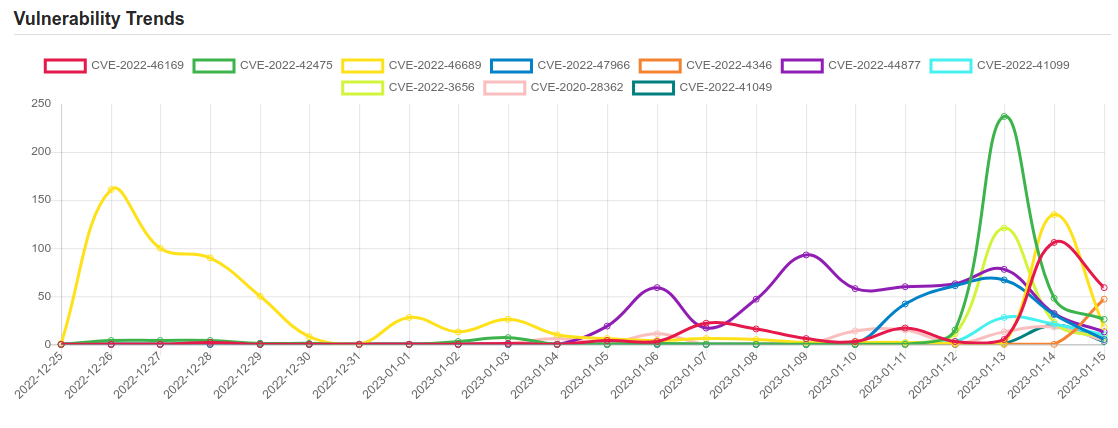Daily Vulnerability Trends: Mon Jan 16 2023

| CVE NAME | CVE Description |
| CVE-2022-3656 | Insufficient data validation in File System in Google Chrome prior to 107.0.5304.62 allowed a remote attacker to bypass file system restrictions via a crafted HTML page. (Chromium security severity: Medium) |
| CVE-2020-28362 | Go before 1.14.12 and 1.15.x before 1.15.4 allows Denial of Service. |
| CVE-2022-41049 | Windows Mark of the Web Security Feature Bypass Vulnerability. This CVE ID is unique from CVE-2022-41091. |
| CVE-2023-20025 | No description provided |
| CVE-2022-23529 | node-jsonwebtoken is a JsonWebToken implementation for node.js. For versions `<= 8.5.1` of `jsonwebtoken` library, if a malicious actor has the ability to modify the key retrieval parameter (referring to the `secretOrPublicKey` argument from the readme link of the `jwt.verify()` function, they can write arbitrary files on the host machine. Users are affected only if untrusted entities are allowed to modify the key retrieval parameter of the `jwt.verify()` on a host that you control. This issue has been fixed, please update to version 9.0.0. |
| CVE-2020-0688 | A remote code execution vulnerability exists in Microsoft Exchange software when the software fails to properly handle objects in memory, aka ‘Microsoft Exchange Memory Corruption Vulnerability’. |
| CVE-2023-21752 | Windows Backup Service Elevation of Privilege Vulnerability. |
| CVE-2018-3729 | localhost-now node module suffers from a Path Traversal vulnerability due to lack of validation of file, which allows a malicious user to read content of any file with known path. |
| CVE-2022-41080 | Microsoft Exchange Server Elevation of Privilege Vulnerability. This CVE ID is unique from CVE-2022-41123. |
| CVE-2023-21746 | Windows NTLM Elevation of Privilege Vulnerability. |
| CVE-2023-20026 | No description provided |
| CVE-2023-21674 | Windows Advanced Local Procedure Call (ALPC) Elevation of Privilege Vulnerability. |
| CVE-2022-4379 | A use-after-free vulnerability was found in __nfs42_ssc_open() in fs/nfs/nfs4file.c in the Linux kernel. This flaw allows an attacker to conduct a remote denial |
| CVE-2022-46169 | Cacti is an open source platform which provides a robust and extensible operational monitoring and fault management framework for users. In affected versions a command injection vulnerability allows an unauthenticated user to execute arbitrary code on a server running Cacti, if a specific data source was selected for any monitored device. The vulnerability resides in the `remote_agent.php` file. This file can be accessed without authentication. This function retrieves the IP address of the client via `get_client_addr` and resolves this IP address to the corresponding hostname via `gethostbyaddr`. After this, it is verified that an entry within the `poller` table exists, where the hostname corresponds to the resolved hostname. If such an entry was found, the function returns `true` and the client is authorized. This authorization can be bypassed due to the implementation of the `get_client_addr` function. The function is defined in the file `lib/functions.php` and checks serval `$_SERVER` variables to determine the IP address of the client. The variables beginning with `HTTP_` can be arbitrarily set by an attacker. Since there is a default entry in the `poller` table with the hostname of the server running Cacti, an attacker can bypass the authentication e.g. by providing the header `Forwarded-For: |
| CVE-2022-42475 | A heap-based buffer overflow vulnerability [CWE-122] in FortiOS SSL-VPN 7.2.0 through 7.2.2, 7.0.0 through 7.0.8, 6.4.0 through 6.4.10, 6.2.0 through 6.2.11, 6.0.15 and earlier and FortiProxy SSL-VPN 7.2.0 through 7.2.1, 7.0.7 and earlier may allow a remote unauthenticated attacker to execute arbitrary code or commands via specifically crafted requests. |
A considerable amount of time and effort goes into maintaining this website, creating backend automation and creating new features and content for you to make actionable intelligence decisions. Everyone that supports the site helps enable new functionality.
If you like the site, please support us on Patreon using the button below
To keep up to date follow us on the below channels.






